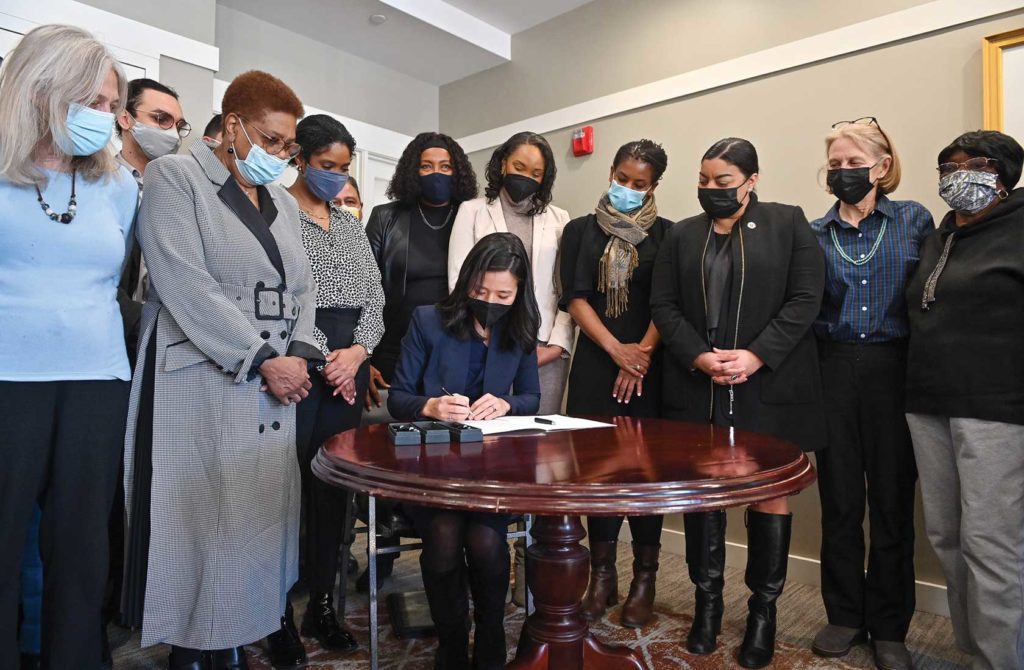Wu, council advance new real estate tax
Tax could raise nearly $100 million in funding for affordable senior housing

On Friday Mayor Michelle Wu signed a home-rule petition in front of colleagues and supporters to implement a transfer fee of up to 2% on real estate sales over $2 million that would raise money for affordable housing and help keep seniors struggling with bills in their homes.
“Boston’s most pressing challenge is our housing crisis, which has been pushing families out of our city and deepened even more with the pandemic. As we see the transformational impact of federal funding for our recovery, it’s clear that Boston needs a reliable funding source to focus on housing affordability and keep families and seniors in their homes,” Wu said Friday.
According to Wu’s office, the first $2 million of the sales price on a home in Boston would be exempt from the fee, and for real estate sales over $2 million, the fee collected will be paid by the seller.
The City Council voted in favor of the home rule petition on Wednesday. Funds generated are to be allocated to the Neighborhood Housing Trust to in turn will create and preserve affordable housing across the city.
In a press release from the city, estimations based on 2021 sales show that a 2% fee would have raised an estimated $99.7 million, and “would have only affected approximately 700 transactions.”
During the city council meeting Wednesday, Councilor Riccardo Arroyo told his colleagues that most of the impacted projects would have been downtown high-priced condominiums and that the fee will generate, “much-needed revenue for affordable housing.”
Additionally, the home rule petition seeks to expand property tax relief for low-income seniors by expanding eligibility and increasing the exemption for its 41C program.
Currently, the 41C program provides tax assistance to residents 65 years or older who are owner-occupants with a gross income at or below $24,911 if they’re single and $37,367 if they’re married. It also stipulates their property value cannot exceed $40,000 for singles or $55,000 for married couples.
Moreover, under the current program rules, those who qualify can receive $1,000 in tax relief for the current fiscal year, and in special circumstances an additional $1,000.
Wu’s proposed program expansion would Iincrease the minimum exemption from $1,000 to $1,500, with a cap at $3,000, replace the fixed income limits with the 50% Area Median Income and double the asset limit levels from $40,000 to $80,000 for singles and from $55,000 to $110,000 for couples.
Basing AMI off the Fiscal Year 2023, the income limits would increase from the current $24,911 to $47,000 for single individuals and $37,367 to $53,700 for a couple. The mayor’s office approximates that the new expansion would more than double eligibility from 4,600 Boston senior homeowners to approximately 8,700 senior homeowners.
The press release from the city also lays out a bleak picture for the current state of senior housing with nearly half of senior homeowners severely housing cost-burdened — paying more than 50 percent of their income to housing costs.
“These changes will modernize the criteria and provide much-needed financial assistance to a vulnerable population,” the release states.
Now signed by Wu, the petition makes its way to Beacon Hill where it must be passed by the Massachusetts Legislature and signed by Governor Charlie Baker — a feat that will not come easily. Representatives from the Greater Boston Real Estate Board (GBREB) and Gov. Baker have both voiced reservations already.
Last week Baker told WGBH, “there is a lot of money around to support housing” while a signed letter from GREEB cites existing real estate fees imposed by the city and state.
“Increasing the tax burden when a home or property changes hands will simply drive-up transaction costs and will most certainly lead to a decrease in residential mobility,” a letter from them states.
State Rep. Brandy Fluker Oakley will be bringing the legislation to the House.
She joined Wu Friday and told those gathered, “I have met with and testified before the City Council about the need for large developers of luxury apartments to pay their fair share, which would allow us to expand property tax exemptions for seniors on a fixed income and make housing in Boston more affordable.”






